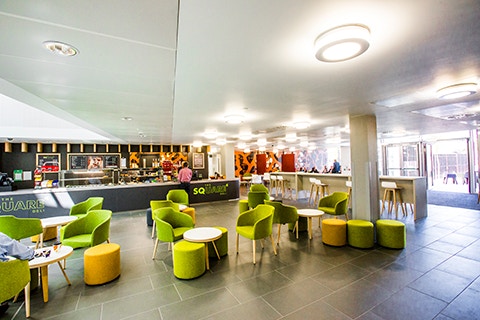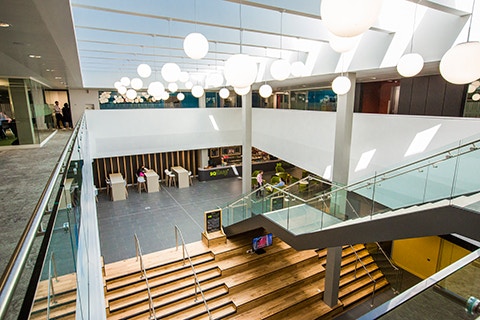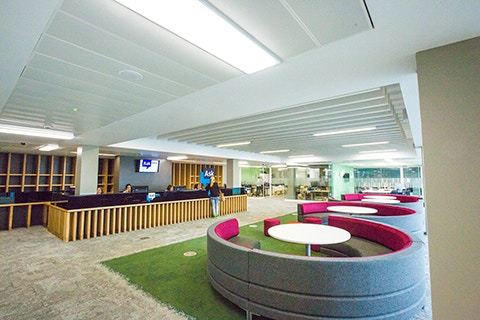
Social Sciences - PhD
Currently viewing course to start in 2024/25 Entry.
The School of Social Sciences supports a growing and vibrant community of PhD students. The PhD is an advanced postgraduate qualification, involving three or more years in which you work through the issues associated with solving a particular problem. Each research student is supported by a team of supervisors appointed for the particular study....
- Level Postgraduate Research
- Study mode Full Time/Part Time/Distance Learning
- Location City Centre
- Award PhD
- Start date September 2024, February 2025
- Fees View course fees
- School School of Social Sciences
- Faculty Faculty of Business, Law and Social Sciences
This course is:
Open to International Students
Overview
The School of Social Sciences supports a growing and vibrant community of PhD students. The PhD is an advanced postgraduate qualification, involving three or more years in which you work through the issues associated with solving a particular problem. Each research student is supported by a team of supervisors appointed for the particular study.
The School welcomes enquiries relating to the fields of psychology, criminology and sociology.
What's covered in this course?
In the School of Social Sciences, staff have recognised standing, nationally and internationally, in the following broad areas:
- understanding crime and punishment;
- the study of all aspects of psychology;
- the exploration of social structures and change.
Our PhD students benefit from regular supervision meetings with academics who are experts in their field. They have the opportunity to become members of our proactive research community made up of academics, postgraduate researchers and external partners.
Why Choose Us?
- The School of Social Sciences has a developing, thriving and vibrant research community of which its PhD students are an essential part.
- Our PhD students benefit from regular supervision meetings with academics who are experts in their field
- Students can make use of library, ICT and social-learning space facilities at our new City Centre Campus;
- Students can, where available, undertake teaching opportunities, collaborate with academics, and contribute to research dissemination events taking place in the School.
- The Centre for Applied Criminology is led by one of the UK’s leading Criminologists, Professor David Wilson.
- You will be encouraged to publish in collaboration with your supervisors and to take part in research conferences.
Find out more
OPEN DAY
Join us on campus where you'll be able to find out more about postgraduate research at BCU, meet our academics and learn more about financing your research degree. Booking for the next event isn’t open yet. Register your interest below and we’ll email you as soon as booking goes live.
Next Event: 29 June 2024
Research Interests
Research in the School of Social Sciences has strong real world applications. Researchers within the School have close links with the local communities, NGOs and organisations such as the Police and Prison Service. They work in collaboration with such groups to inform and drive policy to change the society in which we live.
In Criminology, staff research includes subjects such as Crime Culture & Contemporary Media, Extremism Security Studies & Terrorism, Positive Criminology, Sports Criminology and Birmingham Urban Studies.
In Sociology, staff explore aspects of the African diasporic communities, popular culture, higher education and society and health, housing, domestic abuse and politics.
In Psychology, staff research explores three main areas: cognitive, developmental and disorders; forensic psychology; and individuals, society and health.
Current interests
Criminology research clusters
- Crime, Culture and Contemporary Media
- Birmingham Urban Studies
- Extremism, Security Studies and Terrorism
- Positive Criminology
- Sports Criminology
Psychology research clusters
- Applied Cognition and Technology
- Applications and Interventions in Positive Psychology
- Health and Well-Being
- Inequalities
- PRiDE: Psychological Research in Development and Education
- Applied Forensic Psychology
A full list of opportunities in Psychology research can be found here.
Sociology research clusters
Fees & How to Apply
UK students
Annual and modular tuition fees shown are applicable to the first year of study. The University reserves the right to increase fees for subsequent years of study in line with increases in inflation (capped at 5%) or to reflect changes in Government funding policies or changes agreed by Parliament. View fees for continuing students.
Award: PhD
Starting: Sep 2024
- Mode
- Duration
- Fees
- Full Time
- 3-4 Years
- £4,786 in 2024/25
- Part Time
- 4-7 Years
- £2,393 in 2024/25
- Distance Learning
- 4-7 Years
-
TBC
Award: PhD
Starting: Feb 2025
- Mode
- Duration
- Fees
- Full Time
- 3-4 Years
- £4,786 in 2024/25
- Part Time
- 4-7 Years
- £2,393 in 2024/25
- Distance Learning
- 4-7 Years
-
TBC
International students
Annual and modular tuition fees shown are applicable to the first year of study. The University reserves the right to increase fees for subsequent years of study in line with increases in inflation (capped at 5%) or to reflect changes in Government funding policies or changes agreed by Parliament. View fees for continuing students.
Award: PhD
Starting: Sep 2024
- Mode
- Duration
- Fees
- Full Time
- 3-4 Years
- £14,675 in 2024/25
- Part Time
- 4-7 Years
- £7,338 in 2024/25
- Distance Learning
- 4-7 Years
- £9,180 in 2024/25
Award: PhD
Starting: Feb 2025
- Mode
- Duration
- Fees
- Full Time
- 3-4 Years
- £14,675 in 2024/25
- Part Time
- 4-7 Years
- £7,338 in 2024/25
- Distance Learning
- 4-7 Years
- £9,180 in 2024/25
If you’re unable to use our online application form for any reason, please email Research.Admissions@bcu.ac.uk.
Applications to start this course in September 2022 are now closed, you can apply to begin in February 2023
Entry Requirements
Applicants are required to hold a minimum of a 2:1 Honours degree, in a discipline related to social sciences, to be considered for a PhD. Some PhD opportunities, such as those funded by a particular research council, may additionally require a Masters level degree.
| English language requirements 2022/23 | ||
|---|---|---|
| IELTS |
6.5 overall with a minimum of 6.0 in each category If you do not meet the required IELTS score, you may be eligible for one of our pre-sessional English courses. Please note that you must have a Secure English Language Test (SELT) to study on the pre-sessional English course. More information. |
|
| Other accepted qualifications | Visit our English language page | |
Your research proposal should be no more than 1500 words excluding bibliography.
Research proposal guidance
Your research proposal should address the following areas:
The Working Title of Proposal
Justification for Study
Why do you consider this subject worthy of study at PhD level? This should be considered in some detail providing sufficient background for the non-specialist to be able to gain an idea of the background to the study, its general purpose and its importance.
Outcome of the Study
How will the completed PhD contribute to the body of knowledge associated with this subject? Remember that we will expect a PhD to generate novel data and/or novel interpretations or ideas within a subject area and it must be made clear in your proposal how this will be attempted
Research Methodology
This should include an assessment of the physical, technological, human and literary resources required to undertake quantitative or qualitative research. The research committee is unlikely to look favourably on a proposal that fails clearly to demonstrate what the necessary resources are and that they are readily available (or will be).
Literature Review
This should include a summary of the current debates, areas of contention or controversy, the principal commentators and the seminal works within the subject area.
Course in Depth
A day in the life of a PhD student
If you're considering doing a PhD there's probably a lot of questions going through your mind: how am I going to pay for it? Should I quit my job? Will I cope with the workload? But most importantly, what is it really like? Karen Patel, a full time PhD student, shares her experiences of juggling life, a part time job and her studies.
The PhD Journey
A PhD can take three to four years full-time. Each PhD journey is unique and depends on circumstances and the nature of the research. Broadly, however, most journeys fall into a three stage pattern before completion and examination. Usually, the first stage of the journey involves engaging with what has already been written in the field: identifying the gap in current knowledge. The second stage usually involves doing the research. The final stage in the journey involves collating the data and writing up the findings. In reality, of course, these stages overlap and inform each other.
Modes of study
Our PhD programmes are offered full-time or part-time. These modes of study ensure that we can create a PhD research plan around your lifestyle needs, even if you are in full-time employment or overseas.
Full-time PhD Research: three to four years
As a full-time PhD research student you will undertake much of your research on campus using the facilities available.
You will be expected to complete your research and submit your work for examination within 36-43 months.
Part-time PhD Research: four to seven years
You would chose part-time PhD research if you opt to study whilst in employment or if full-time study is impractical.
You will be encouraged to use the campus facilities when you can and may often work from home.
You will be expected to complete your research and submit your work for examination within 48-72 months.
How the PhD is assessed
The criteria to be awarded a PhD is to make a ‘unique contribution to knowledge.’ Whether a student has achieved this is determined by a panel of experts, including internal and external academics. The panel will assess the student’s written thesis, and the student’s oral defence of that thesis in a viva voce.
Employability
Employment Opportunities
The PhD award is a well established and valued professional qualification within the sector and will enhance career prospects. For those wanting to follow a career in teaching and researching in higher Education, a PhD is highly desirable.
The value of a PhD to employability
The PhD is recognised worldwide and is often an essential requirement for those wishing to follow an academic research career. However, it is increasingly recognised as useful in industry, commerce and the Third Sector.
International
Birmingham City University is a vibrant and multicultural university in the heart of a modern and diverse city. We welcome many international students every year – there are currently students from more than 80 countries among our student community.
The University is conveniently placed, with Birmingham International Airport nearby and first-rate transport connections to London and the rest of the UK.
Our international pages contain a wealth of information for international students who are considering applying to study here, including:
- Explore some of the good reasons why you should study here.
- Find out how to improve your language skills before starting your studies.
- Find all the information relevant to applicants from your country.
- Learn where to find financial support for your studies.
Facilities & Staff
Supervisors
The departments also work in an interdisciplinary way, so there is a great deal of collaborative working within Social Sciences. See more information about Social Sciences staff and their specific interests here.




Our Facilities
We are constantly investing in our estate and have spent over £400 million on new learning facilities.
The Curzon Building
This course is based at our City Centre Campus – and specifically The Curzon Building, alongside other social sciences, law and business students.
The £63m building offers students a unique social learning space, including a dedicated student hub incorporating student support services, in the heart of Birmingham’s Eastside development.
Realistic, simulated environments include two mock court rooms, a Magistrates' and Crown Court, and an interviewing suite. We’re also exploring the use of virtual environments as a way to develop case study analysis.
For those studying on the BSc (Hons) Professional Policing or BA (Hons) Criminology, Policing and Investigation degrees, you’ll experience simulations of police interviewing environments for both suspects and witnesses, with access to tape recording and video playback analysis. You’ll also be able to utilise our unique mobile crime scene to simulate true-to-life and interactive situational simulations.
Crime investigation files are prepared using computer-based technology, and the crime data analysis requirements of the degree are supported by appropriate statistical and analytical software.
Psychology students can look forward to using state-of-the-art equipment as well, including the latest in eye-tracking software, and our new EEG machine, all geared towards giving you true hands-on experience with tools you’ll be using in your later career. You will also benefit from facilities across the wider campus including the Parkside and Millennium Point buildings.
The Curzon Building also features:
- An impressive library with access to over 65 million full text items and stunning views of Eastside City Park
- Your Students’ Union which is located in a beautifully restored 19th century pub, The Eagle and Ball
- A modern 300-seat food court with space to study and socialise
- Accessible IT facilities with full Office365 for all students for free
- Shared facilities with the wider campus including the Parkside Building and Millennium Point

